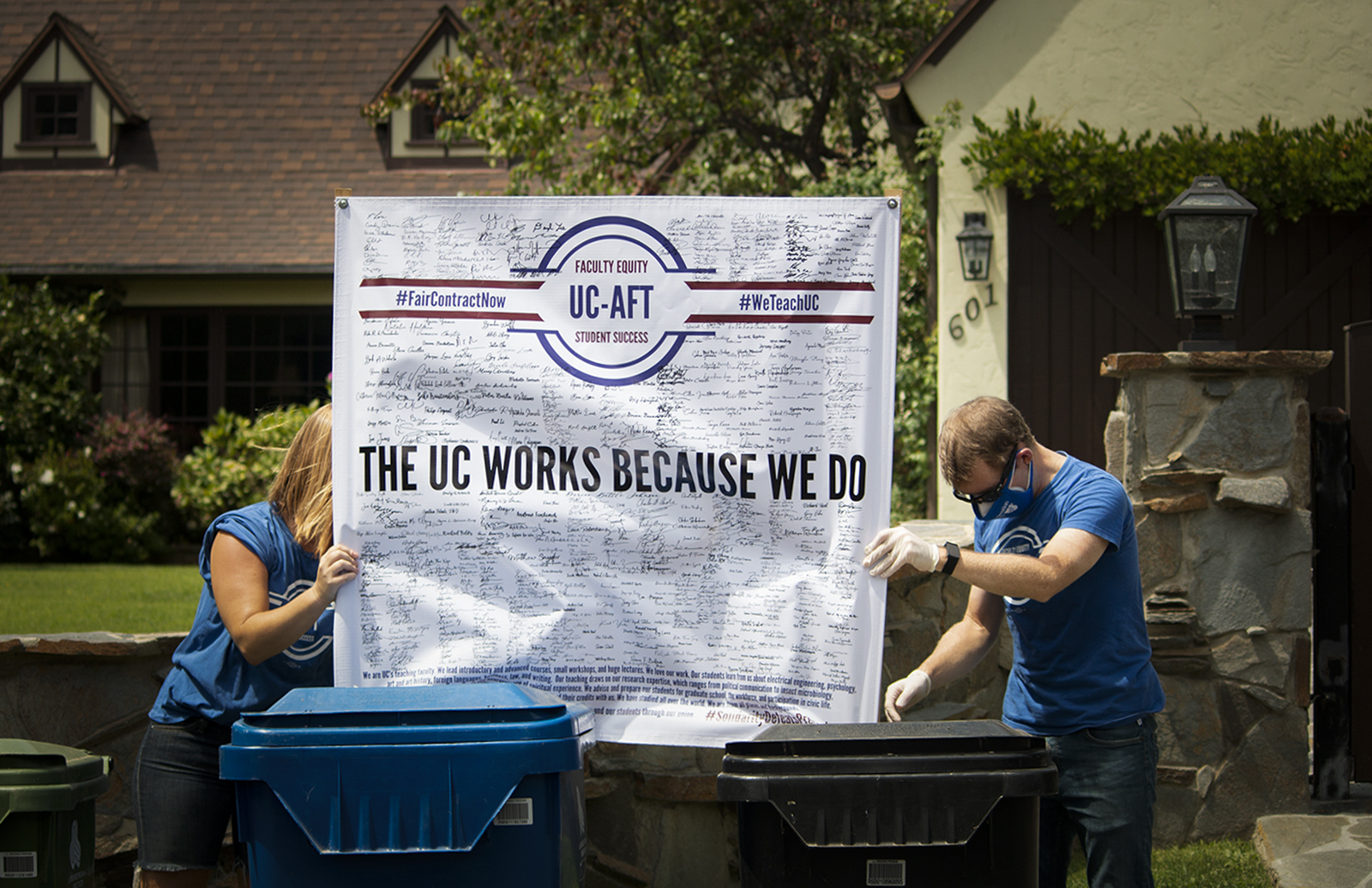UC-AFT adopts strike readiness pledge after 2 years of negotiating with UC

After two years of contract negotiations with the University of California Office of the President, the University Council-American Federation of Teachers adopted a strike readiness proposal and pledge. If UCOP and UC-AFT are unable to reach an agreement, the union may vote to strike. (Daily Bruin file photo)
By Emily Kim
April 27, 2021 7:53 p.m.
This post was updated April 28 at 5:18 p.m.
The University Council-American Federation of Teachers adopted a strike readiness resolution and pledge after two years of negotiations with the University of California Office of the President over improved job security, fair wages and compensation of unpaid workload for UC lecturers.
In the strike readiness pledge, which the union adopted April 1, UC-AFT called for greater job security through rehiring preferences, which would give preference to previously employed lecturers to teach when a relevant course opens. The pledge also called for unbiased evaluations to determine clear criteria for rehiring and multiyear appointments for pre-six lecturers. Pre-six lecturers are those who have taught 18 quarters or less. If UC-AFT and UCOP cannot reach an agreement, the union may vote to authorize a post impasse strike, said UC-AFT President Mia McIver.
According to the resolution, the average UC lecturer teaches less than two years, and 40% of pre-six lecturers are not renewed for the next year. No evaluation process exists outside of student evaluations, making it difficult for lecturers to know why they may not be rehired.
[Related link: The Quad: Course evaluations allow faculty to track effectiveness of remote learning]
UC-AFT also demanded livable wages that reflect lecturers’ training and experience and account for the high cost of living in California. According to the resolution, UC lecturers receive a median annual salary of $19,067, a number that qualifies as low-income at six of the UC campuses, including UCLA, based on criteria set by the U.S. Department of Housing and Urban Development.
If the union and UCOP are unable to reach an agreement after extensive bargaining, then UC-AFT may move to authorize a post impasse strike – a process that requires multiple steps.
Before potentially going on strike, both parties would have to undergo several legally mandated processes to certify impasse, such as mediation and fact-finding. UC-AFT would also internally put the strike authorization to a vote among its members.
For students, a strike would mean that lecturers would stop teaching classes, holding office hours, attending committees and writing letters of recommendation. A strike could last for a couple days or longer, McIver said.
“No one enters into a strike lightly,” McIver added. “I really see a strike as a short-term sacrifice for a long-term essential improvement in working conditions and teaching conditions.”
In order to avoid or end a strike, UC-AFT would require an agreement from UCOP on an evaluation and rehiring process, fair compensation and an agreement to address unpaid workload, she added.
[Related link: UCLA lecturers and other nontenure faculty face low wages and job insecurity]
Negotiations between the parties have lasted roughly two years, with some UC-AFT members concerned about the limited number of proposals UCOP has made to address issues of job security, as well as unresponsiveness and delays.
UCOP spokesperson Ryan King said UCOP’s most recent proposal on April 16 offered a 5% increase in lecturers’ minimum salary and a transition from a salary range to a salary scale. Under a salary scale, lecturers’ units would receive a 1.5% pay increase and for the duration of the contract, they would receive a 2% pay increase annually.
In addition, subsequent appointments of pre-six lecturers would be two-year appointments with a guaranteed percentage appointment for both years, he added. A percentage appointment describes how many classes lecturers are hired to teach.
“We remain hopeful that we are on a positive path toward the parties reaching a full, multi-year collective-bargaining agreement covering UC lecturers,” King said in the statement.
However, many UC-AFT members said they were unsatisfied with the proposal.
John Branstetter, president of the UCLA chapter of UC-AFT, said the proposed salary increase might actually be worse for lecturers because it does not keep up with the cost of living.
Moreover, an effective rehiring process including rehiring preferences and evaluations – two elements that UCOP’s most recent proposal lacks – already exist in the California State University system and the California community colleges, said Daniel Schoorl, vice president for organizing at UC-AFT.
King said the University is doing everything possible at the bargaining table to reach an agreement quickly, but a contract also requires the partnership of union leaders.
Amid negotiations, some UC-AFT lecturers said they are concerned about hurting their students by potentially going on strike. McIver said their current working conditions are hurting their students now.
Branstetter said lecturers’ precarious job security affects the quality of undergraduate education at the UCs, as lecturers are often distracted from their classes applying to jobs over concerns of being unemployed next year.
Ultimately, a strike is a serious sacrifice for members and would be a last resort, Schoorl said.
“We’re really asking the University to argue in good faith and present proposals that work for both sides, but that honor the labor and the value that lecturers bring to the UC,” he said.


